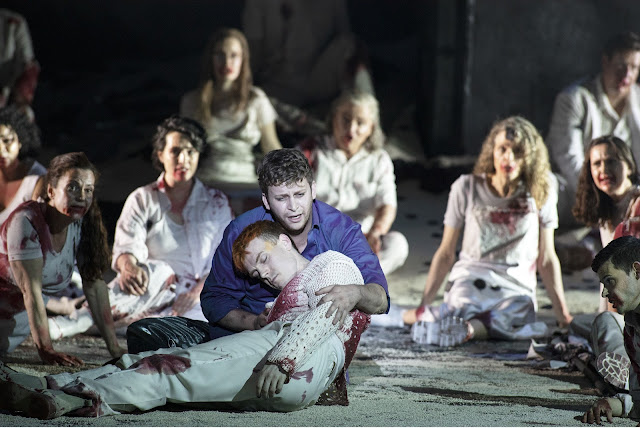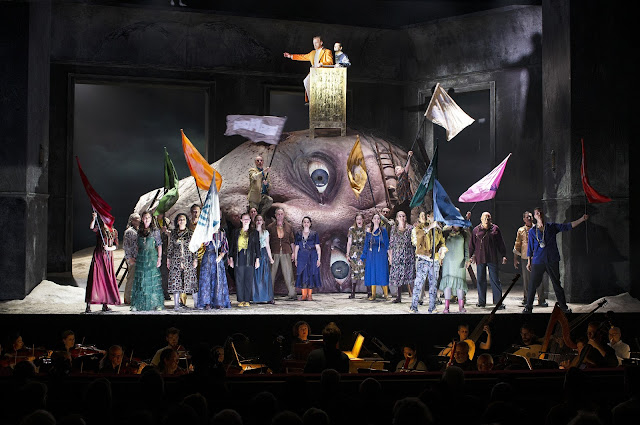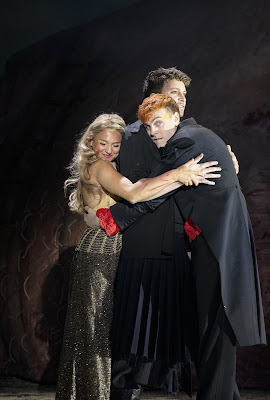 |
| Handel: Saul - Rupert Charlesworth, Aryeh Nussbaum Cohen - Komische Oper, Berlin (Photo Barbara Braun) |
Handel: Saul; Luca Tittoto, Aryeh Nussbaum Cohen, Rupert Charlesworth, Nadja Mchantaf, Penny Sofoniadou, director Axel Ranisch, conductor David Bates; Komische Oper Berlin
An international cast bring Handel's oratorio to vivid and striking life in an evening of musical and dramatic pleasures.
Over the Whitsun weekend, the Komische Oper Berlin had something of a Handel festival on with revivals of Barrie Kosky's production of Handel's Semele and Stefan Herheim's production of Handel's Serse, plus a new production of Saul.
Axel Ranisch's staging of Handel's Saul opened on Saturday 27 May 2023 with David Bates conducting. Luca Tittoto was Saul with Rupert Charlesworth as Jonathan, Aryeh Nussbaum Cohen as David, Nadja Mchantaf as Michal and Penny Sofoniadou as Merab. Stage design and videos were by Falko Herold and costumes by Alfred Mayerhofer.
The work was sung in English and was, perhaps inevitably, cut. Bates conducted the Komische Oper orchestra with the addition of Baroque harp, Baroque trumpets and Baroque timpani (duplicating the special low timpani that Handel borrowed from the Tower of London) plus two harpsichords, organ and two theorbos.
Before the music started, we heard a German voice whispering the plot so far (quite a complex one) to accompany Herold's vivid animation of the story. The orchestral sound, from the outset, was crisp and vivid, with historically informed string articulations accompanying an equally striking stage picture as the chorus appeared, rejoicing, in multi-coloured clothes (modern with a nod to hippie-chic).
 |
| Handel: Saul - Komische Oper, Berlin (Photo Barbara Braun) |
Handel's oratorios present challenges to any director. Not written for staging, they combine dramatically vivid elements with the more static such as large-scale choruses and, in Saul, the long multi-partite elegy for Jonathan. They also presume on the audience's familiarity with the subject, there are often gaps in the dramaturgy.
For this production, the dramaturge was Johanna Wall and between them, she and Ranisch, who is a German actor and film director with some operatic experience behind him, had crafted a dramatic narrative that did no real violence to Handel's work but filled in the gaps. The basic focus was on Saul's family and the effect on his children of having such a disturbed father. All three siblings were presented as damaged, perhaps brutalised. The relationship between Charlesworth's Jonathan and Nussbaum Cohen's David was a gay one, complete with an intense, and of course, logically, this led to a triangular relationship with Mchantaf's Michal. Not Biblical, certainly, but a logical conclusion to the information Handel and his librettist, Charles Jennens, provide us with.
Less successful was the staging of the choruses. Jubilation and
celebration worked fine, but some of the choreography was trite, notably
that for the maidens greeting the victorious David, the Envy chorus,
with chorus members crowding around David's bed, came over as creepy and
surely it is Saul who is suffering from envy? And the final elegy,
heavily truncated, rather overused fake blood and required the dead to
come back to life.
 |
| Handel: Saul - Nadja Mchantaf, Rupert Charlesworth, Aryeh Nussbaum Cohen - Komische Oper, Berlin (Photo Barbara Braun) |
The set was fixed, covered in sand, but for most of Act One pride of place went to the humungous head of Goliath with action taking place on, around and in the head. The skull version formed the Witch of Endor's home. Handel's oratorio ends with the elegy followed by final jubilation, but at the end of the production, there was a surprise. Nussbaum Cohen remained alone on stage, completely stationary and sang Herbert Howells' song King David in a lovely RVW-ish orchestration by Iain Farrington. It worked, thanks to Nussbaum Cohen's mesmerising performance and gave us an ending that emphasised David's melancholy rather than the Israelites' triumph.
Italian bass, Luca Tittoto was a magnificent Saul, cutting a handsome figure and singing with an admirably free and focused voice. He roared superbly and gave us a clear picture of Saul's mental decline. Handel does not give Saul a major aria but it was clear that Tittoto's singing was very stylish. His English was somewhat accented, true, but he spat the words out in a wonderfully non-Italian manner, clearly understanding the role that text plays in oratorio.
Aryeh Nussbaum Cohen's David was not the slight, youthful figure that we might expect, but a strapping lad with a voice to match. Able to conjure moving simplicity in 'O Lord, whose mercies numberless', Nussbaum Cohen was admirably vigorous elsewhere, singing with wide-ranging freedom and ease. His diction was not always crisp but overall this was a vivid stage incarnation of the character. And this David was quite a lad, smitten by Charlesworth's David, he was equally enthusiastic with Mchantaf's Michal (and Ranisch showed the results with a pregnant Michal at the end of Act Two.
Rupert Charlesworth's Jonathan was nervous, almost neurotically so, profoundly damaged by his father. His and Nussbaum Cohen's David began their relationship from the offset, with a coup de foudre, and throughout Charlesworth brought out the way Jonathan was on edge. His declaration of love for David was intense indeed and followed by that kiss and extended make-out session between the two men. Jonathan, however, disappears from Handel's oratorio in Act Three, alas.
Nadja Mchantaf made a striking Michal, bubbly yet intense and neurotic,
needy of affection. She threw herself at Nussbaum Cohen's David at first
sight, well before their marriage, and much of Act One featured
Mchantaf, Nussbaum Cohen and Charlesworth in a variety of trilogies.
Mchantaf made a fine Handel singer, with her and Nussbaum Cohen as a
most enjoyable pairing. As her sister, Merab, Penny Sofoniadou was
wonderfully bitchy, yet she softened in Act Two and made a fine foil for
her sister.
Ivan Tursic was a vivid Witch of Endor (thankfully
played by a man) though he tended to force his tone for dramatic effect.
Stephen Bronk's Samuel was a nicely understated foil to Tursic's Witch.
Tansel Akzeybek, Ferhat Baday and Ferdinand Keller provided sterling
support as the High Priest, Doeg and the Amalekite, though I still
prefer Barrie Kosky's solution of combining the High Priest and Doeg
into a single role.
A word about the diction; this varied from
the wonderfully clear and idiomatic (Rupert Charlesworth was exemplary
here) to the occluded and sometimes unintelligible. Inevitable with an
international cast perhaps, and we have all been to performances with
all-Anglophone casts where diction has been woefully lacking. I was
unclear whether this was simply a result of the Komische Oper's
repertory system or whether English remains a somewhat problematic
language.
 |
| Handel: Saul - Ferhat Baday, Luca Tittoto - Komische Oper, Berlin (Photo Barbara Braun) |
The orchestra was in fine fettle and under Bates' direction gave us a stylish and vivid account of this, one of Handel's more richly orchestrated scores. Bates directed from the harpsichord with a second keyboard player, Sabine Erdmann, doubling (tripling) harpsichord, organ and the all-important carillon. The interval was part-way through Act Two and the second half began with a fine account of one of Handel's organ concertos from Erdmann.
My preference remains for unstaged Handel oratorios, but the team at the Komische Oper created a vivid evening in the theatre, bringing Handel and Jennens' characters to stage life with style, imagination and not a little daring.
Never miss out on future posts by following us
The blog is free, but I'd be delighted if you were to show your appreciation by buying me a coffee.
Elsewhere on this blog
- No ordinary evening: Christof Loy directs Zandonai's Francesca da Rimini at the Deutsche Oper Berlin with Sara Jakubiak & Jonathan Tetelman - opera review
- The story is 40 years old but nothing much has changed about women's rights in the region: Bushra El-Turk on her opera Woman at Point Zero which comes to Covent Garden next month - interview:
- Regents Opera's new production of Wagner's Die Walküre: a photo essay
- Ein Sommernachtstraum in Essen: Jérémie Rhorer and Le Cercle de l'Harmonie - concert review
- Songs of heartbreak and loss: Lovesick, American counter-tenor Randall Scotting explores 17th-century song from Dowland to Purcell, Étienne Moulinié to Antonio Cesti - record review
- From Psychic Shellfish to a leading role in Wagner's Ring Cycle: Ingeborg Børch's Regents Opera journey - feature
- Grażyna Bacewicz's piano concertos and more: an exciting disc from Peter Jablonski & the Finnish Radio Symphony Orchestra - record view
- A lovely immediacy to the performances: in Monologues, Anna Bonitatibus explores a century of dramatic scenes for solo voice - record review
- Steeping listeners in Indian classical music without them knowing it: sitar player Jasdeep Singh Degun on his new disc, Anomaly, working on Opera North's Orpheus and more - feature
- Then I play'd upon the Harpsichord: Ensemble Hesperi's engaging look at the musical life of Queen Charlotte - video review
- A love of telling stories: Norwegian composer Bjørn Morten Christophersen on setting Charles Darwin's 'On the Origin of Species' to music - interview
- Home











No comments:
Post a Comment